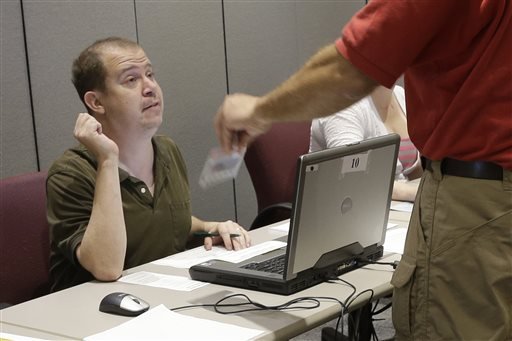LITTLE ROCK, Ark. — Early voting starts this week for Arkansas' June 10 primary runoff, though the state's election office doesn't expect many people to do so.
Only one statewide race is on the ballot, a Republican Party contest to determine its nominee for attorney general. A Republican state Senate primary in northern Arkansas and a Democratic state House runoff in the Pine Bluff area also must be decided.
Secretary of State's office spokeswoman Laura Labay said about 71,200 people are expected to vote in the June 10 runoff; residents can begin casting ballots Tuesday.
Labay based her prediction on the typical fall-off between primary elections and runoffs. If it holds, the typical Arkansas precinct — there are about 2,500 of them — would see fewer than 30 voters in the entire day. In 2012, just over 4 percent of registered voters went to the polls, though some counties didn't have major contests.
"Runoffs are usually low and it's up to the candidates to get voters out," Labay said. "You always want people who are registered to vote to vote."
The May 20 primary drew 21 percent of the state's 1.6 million registered voters.
The attorney general's race features Leslie Rutledge, a former lawyer for ex-Gov. Mike Huckabee and the Republican National Committee, and David Sterling, a lawyer in private practice at Little Rock who wants to bring back the electric chair. The winner will face Democratic state Rep. Nate Steel of Nashville and Libertarian Aaron Cash in the November general election.
Both Republican candidates say they are interested in repelling what they perceive as an overbearing federal government. Sterling has said he'd approve a task force to explore federal encroachments on state rights, while Rutledge has said a special study isn't necessary.
Sterling has also said Arkansas should explore the use of the electric chair for executions amid ongoing challenges to the state's lethal injection procedures. Rutledge opposes Sterling's plan.
Rutledge finished about 9,000 votes short of winning the seat outright in the primary; about 160,000 votes were cast.
The District 17 state Senate race features Rep. John Burris of Harrison, an architect of a plan to use federal dollars to help pay insurance premiums for the state's poorer residents, and Scott Flippo of Mountain Home, who opposes the private-option Medicaid expansion. Burris led Flippo by just 63 votes two weeks ago. There is no Democratic candidate on the ballot in November.
In southeastern Arkansas, Pine Bluff Democrats Ken Ferguson and Win Trafford will face off for the party's nomination in House District 16. Ferguson held a 19-vote advantage in the three-way primary on May 24. There is no GOP opponent in November's race.
